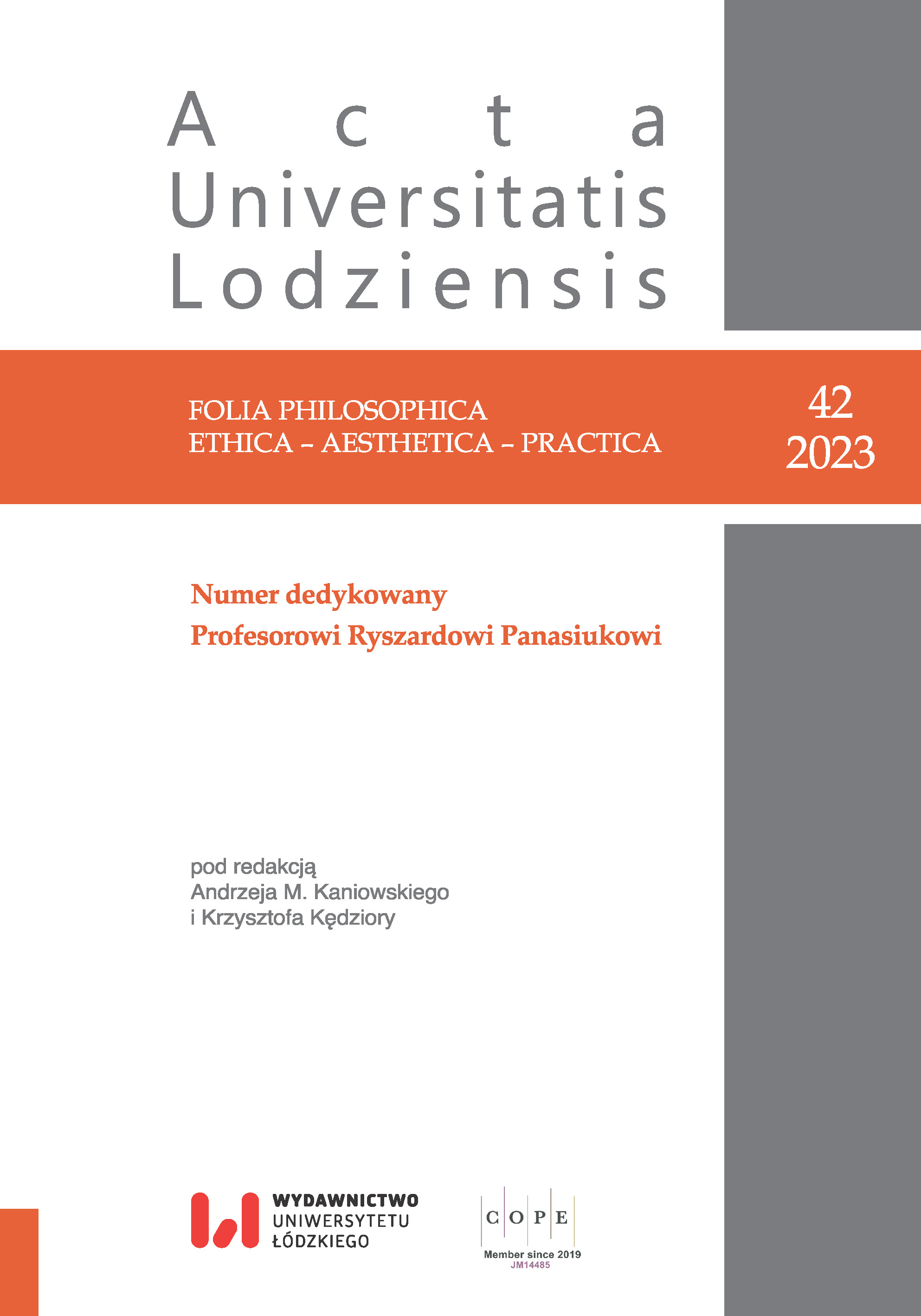The Problem of Freedom and Evil in Kant’s Thought (Religion within the Limits of Reason Alone) and Schelling’s (Philosophical Investigations into the Essence of Human Freedom)
DOI:
https://doi.org/10.18778/0208-6107.42.02Keywords:
Kant, Schelling, autonomy, freedom, choice, evilAbstract
The aim of the article is to show the influence of Kant’s concept of freedom and evil on Schelling’s thought presented in his so-called writing on freedom. In the first part, I show the difficulties with explaining evil as a moral category within the framework of Kant's conception of freedom as rational autonomy, which is presented in Groundwork of the Metaphysics of Morals and in Critique of Practical Reason: Kant identifies freedom with obedience to moral law and in this manner he is not able to lay the foundations for making a choice between good and evil, nor the personal and individual nature of freedom of man as a sensual-rational totality. Then I show the unsatisfactory attempt to solve them in Religion within the Limits of Reason Alone, in which he takes up the issue of the possibility of evil as an act of freedom within the framework of the theory of maxims: Kant is not able to define the status of the propensity for evil as the extra-empirical basis for evil nor its generality. In the second part, I show Schelling’s original concept of freedom, in which he exhibits the individual and personal nature of freedom. This concept allowed him to make an attempt to solve the problem of evil taken over from Kant.
References
Fackenheim, E.L. (1953). Kant and radical evil, University of Toronto Quarterly, 22, s. 339–353.
Google Scholar
Kant, I. (1900-). Gesammelte Schriften. Bd. 1–22 Preussische Akademie der Wissenschaften, Bd. 23 Deutsche Akademie der Wissenschaften zu Berlin, ab Bd. 24 Akademie der Wissenschaften zu Göttingen.
Google Scholar
Kant, I. (1984a). Krytyka praktycznego rozumu. Tłum. J. Gałecki. Warszawa: Państwowe Wydawnictwo Naukowe.
Google Scholar
Kant, I. (1984b) Uzasadnienie metafizyki moralności. Tłum. M. Wartenberg. Warszawa: Państwowe Wydawnictwo Naukowe.
Google Scholar
Kant, I. (1993). Religia w obrębie rozumu. Tłum. A. Bobko. Kraków: Homini.
Google Scholar
Noller, J. (2017). Theorien des Bösen. Zur Einführung. Hamburg: Junius.
Google Scholar
Noller, J. (2018). Vom Unvermögen zum Un-Vermögen. Reinhold und Schelling über unmoralische Freiheit nach Kant. Deutsche Zeitschrift für Philosophie, 66/2, s. 162–182.
Google Scholar
DOI: https://doi.org/10.1515/dzph-2018-0014
Noller, J. (2020). „Vernünfteln”. Kant und das Problem der Rationalität des Bösen. Deutsche Zeitschrift für Philosophie, 1 (68), s. 28–50.
Google Scholar
DOI: https://doi.org/10.1515/dzph-2020-0002
Noller, J. (2022). Die Reflexion des Willens. Schellings Transformation des Kantischen Autonomiebegriffs in den „Untersuchungen über das Wesen der menschlichen Freiheit”. Online: https://www.academia.edu/33405377/ [dostęp: 27.12.2023].
Google Scholar
Panasiuk, R. (2020). Przyroda. Człowiek. Polityka. Z dziejów filozofii niemieckiej XVIII/XIX wieku. Warszawa: Oficyna Naukowa.
Google Scholar
Piórczyński, J. (1999). Wolność człowieka i Bóg. Studium filozofii F.W.S. Schellinga. Warszawa: Państwowe Wydawnictwo Naukowe.
Google Scholar
Schelling, F.W.J. (1990). Filozoficzne badania nad istotą ludzkiej wolności i sprawami z tym związanymi. Tłum. B. Baran. Kraków: Inter esse.
Google Scholar
Schönecker, D. (2011). Kant’s „Grundlegung” über den bösen Willen. Eine kommentarische Interpretation von GMS 457, 457, 25-458, 5. Studi Kantiani, 24, s. 73–91.
Google Scholar
Schulte, Ch. (1991). Radikal Böse. Die Karriere des Bösen von Kant bis Nietzsche. München: Fink.
Google Scholar
DOI: https://doi.org/10.30965/9783846726808
Downloads
Published
How to Cite
Issue
Section
License

This work is licensed under a Creative Commons Attribution-NonCommercial-NoDerivatives 4.0 International License.












